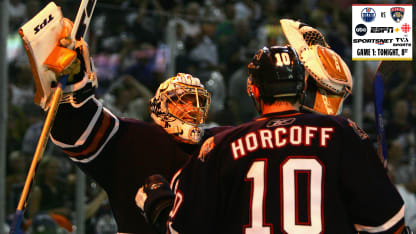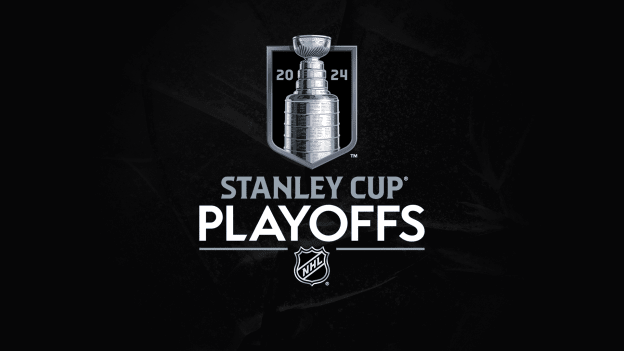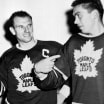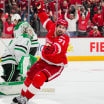EDMONTON -- Dwayne Roloson and Shawn Horcoff know firsthand the excitement a run to the Stanley Cup Final by the Edmonton Oilers can generate in the city and throughout Canada.
Roloson and Horcoff were members of the 2006 Oilers, who made an unexpected trip to the Stanley Cup Final, where they lost in seven games to the Carolina Hurricanes.
“It’s crazy, everyone talks about every other town and city in Canada and the U.S., and everyone can say they’re the loudest and the best until you come to Edmonton,” Roloson said. “When you come here and you’re part of this and you see what goes on here, there’s no comparison to anywhere else. The young fans from our ’06 run, they’re older now and they’re coming out again, and it’s awesome, it’s fun, it’s always a great time to come out here and it’s a great thing to be a part of.”
A Canada-based team has not won the Stanley Cup since the Montreal Canadiens defeated the Los Angeles Kings in the 1993 Final. Since then, five Canada-based teams have advanced to the Final: the Vancouver Canucks (1994, 2011), Calgary Flames (2004), Oilers (2006), Ottawa Senators (2007), and Canadiens (2021).
The Oilers can end the drought, against the Florida Panthers in the best-of-7 Stanley Cup Final, starting with Game 1 at Amerant Bank Arena in Sunrise, Florida, on Saturday (8 p.m. ET; ABC, ESPN+, SN, TVAS, CBC).
“Up there (Canada), hockey is life, it is the biggest sport by far and everyone is a hockey fan,” said Horcoff, a forward for Edmonton in 2005-06 and now the assistant general manager of the Detroit Red Wings. “It’s not like other cities in the U.S. where there are hockey fans and NBA fans and baseball fans. Everyone is a hockey fan and in a lot of ways, all of Canada is kind of pulling for a Cup to return there because it’s been so long.
“I’m sure you have fans in other cities and in the province as well cheering for them. Maybe not in Calgary or Vancouver where you have your diehard fans, but I think there are a lot of neutral fans in Canada pushing for a Canadian team to win it again.”
Roloson and Horcoff each see comparisons in the Oilers’ last two trips to the Stanley Cup Final but acknowledge the teams were not constructed in a similar fashion.
“Anytime anybody is on a run there are always comparables,” said Roloson, a goalie for Edmonton during its run to the Final 18 years ago. “This team is built a little bit different, they have superstars, not that we didn’t have any, but we were more a meat-and-potatoes type of team. It’s great to see, it’s great to see the city excited again, hopefully they can carry through.”
The Oilers of 2024 are led by centers Connor McDavid and Leon Draisaitl, two of the most dynamic offensive players in the NHL.
“There’s a lot more pressure on them to have success,” Roloson said. “We clinched the second-last game of the year to get in the playoffs. Whatever we did in the playoffs was just gravy. For these guys, it’s been pressure for the last two or three years to do something.
“Their superstars are under a lot more pressure because they’re being held up to the standards of [Paul] Coffey, [Wayne] Gretzky, [Mark] Messier and 'What’s their legacy going to be if they don’t win?' So there’s a lot more pressure on them than it was for us.”
In 2006, Edmonton had one of the best defensemen in the League in Chris Pronger, but the rest of the team was made up of hard-working, blue-collar players, who caught lighting in a bottle and came together at the right time.
“We really came together well,” said Horcoff, who was second on the team in scoring behind forward Ales Hemsky, with an NHL career-high 73 points (22 goals, 51 assists) in 79 games that season. “We didn’t clinch until there were one or two games left in the regular season, so just making the playoffs alone was great. ‘Prongs’ was a superstar defenseman and ‘Smytty’ [forward Ryan Smyth] was a fantastic player in his own right, but now you’re talking about Connor McDavid and Leon Draisaitl and they’re two of the elite superstars, so the teams couldn’t be any more different, really.”
In 2005-06, the Oilers finished eighth in the Western Conference and had to face the top-seeded Detroit Red Wings in the opening round. Edmonton upset Detroit in six games and moved on to play the San Jose Sharks in the conference semifinals.
The Oilers lost the first two games on the road, but got back in the series with a 3-2 win in Game 3 in Edmonton on a triple-overtime goal by Horcoff. The Oilers went on to win the series in six games and advance to the Western Conference Final.
“Having beaten an incredible Detroit Red Wing team in that first round and to get through that first round alone was fortunate for us and it gave us a lot of confidence,” Horcoff said. “And then against San Jose in the second round, those first two games they gave it to us, it was like playing the (Soviet) Red Army. We barely touched the puck in those first two games and then we were able to come back and win Game 3 in overtime and were able to come back and win that series.”
After defeating San Jose, the Oilers moved to to play the Mighty Ducks of Anaheim and by that time were rolling. They dispatched Anaheim in five games to get to their first Final since 1990.
“Going on to face Anaheim, they were on the verge of being a great team with Corey Perry, Ryan Getzlaf and those guys there,” Horcoff said. “I do think after the Detroit series we really started to gain momentum and ‘Rollie’ [Roloson] played fantastic and we had an elite defenseman at that time in ‘Prongs’, who was playing so well and we got a lot of different contributions from different people.”
At the time, the Oilers were a Cinderella story and came within a game of winning the Stanley Cup for the sixth time in their history. They lost 3-1 in Game 7 at Carolina following a convincing 4-0 win against the Hurricanes in Game 6.
Roloson, who was one of four goalies used by Edmonton that regular season, emerged as the No. 1 goalie during the playoffs and was 12-5 with a 2.33 goals-against average, .927 save percentage and one shutout in 18 postseason games. But he did not play the final six games of the Cup Final after a knee injury in Game 1.
Every game of that 2006 run was a bonus for the Oilers, unlike this season’s team, which was expected to contend for the Stanley Cup.
“The most vivid memory is losing,” Horcoff said. “You get to go that far and then you lose in Game 7, it’s tough, it stays with you forever and it’s not an easy thing to go through.
"I wouldn’t trade the experience for the world, but you’re there to win and you get that close, and you lose a game where you could win it all, it’s a tough pill to swallow.”



















